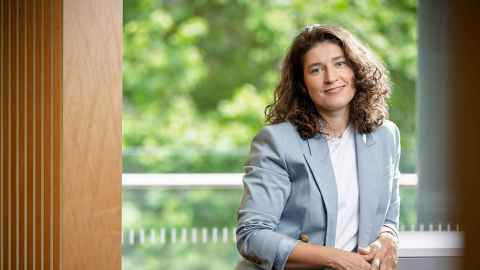Alexandra Andhov: a chance to explore the unknown
2 December 2024
Professor Andhov delves into the gap between the rapid evolution of AI and the legal systems that might regulate it.

Professor Alexandra Andhov might turn to OpenAI’s ChatGPT to refine the tone of an email or brainstorm title ideas, but her real interest lies in understanding how OpenAI, which began as non-profit research organisation, transformed into a for-profit powerhouse.
“OpenAI collected vast amounts of data for free over time, initially as a non-profit, built ChatGPT, and within seven years achieved a $160 billion valuation. That’s what I’m interested in; how is this possible, and why isn’t anyone talking about it?”
The unchecked growth and operations of OpenAI raises ethical and legal questions about transparency and accountability. However, Alexandra says the challenge in AI regulation goes beyond just setting rules.
“To establish meaningful regulation, a strong understanding of the technology is crucial. Artificial intelligence is misunderstood by many people, including lawyers and policymakers, who talk about it as if it’s truly ‘intelligent’. But it’s just sophisticated statistical modelling with layers of algorithms.
“It’s only as ‘smart’ as the data and the logic it’s trained on.”
Alexandra joined the University of Auckland’s law and business faculties in October as Chair of Law and Technology and Director of the Centre for Advancing Law and Technology Responsibly. Her wife, Associate Professor Marta Andhov, whose expertise spans public procurement law, sustainability and contract law, also joined the University with joint appointments at both faculties.
The two, somewhat serendipitously, met at the University of Copenhagen.
“We were both hired at the same time by the same centre. Marta had moved to Copenhagen from Aarhus, and me from Budapest. Being new to both the university and the city, we quickly became close friends. Somehow, and a bit unexpectedly, that friendship grew into something more, and now I’m lucky to say that I married my best friend.”
Alexandra designed and taught an original start-up law course at the University of Copenhagen, where students engaged directly with start-ups and, in some cases, launched their own ventures. She hopes to introduce a similar course for Auckland law and business students focusing on start-up law and the life cycle of entrepreneurial ventures.
“By teaching students how to navigate the unique needs of start-ups, I hope to inspire entrepreneurial, adaptable legal thinkers and problem solvers.”
AI is only as ‘smart’ as the data and the logic it’s trained on.
Alexandra was born in Czechoslovakia before the ‘velvet divorce’, which saw Slovakia declare itself a sovereign state.
At 14, she convinced her parents to let her travel alone to the US, where she spent a summer with a host family in Naperville, Illinois, immersing herself in a new culture and language.
“I was curious and eager to experience more of the world, and I was lucky to have parents who supported me.”
Despite attending a school focused on mathematics and physics from the age of ten, Alexandra felt drawn to a different path.
“I loved science, but I also loved discussions and the ability to argue and persuade, so I chose to study law.”
During her undergraduate law studies in Bratislava, she worked for a law firm and undertook an exchange year at Lund University in Sweden, where a professor sparked her interest in legal research.
“Professor Xavier Groussot showed me that law isn’t just a set of rules but a creative field where you can challenge ideas and explore complex questions,” she says.
Alexandra graduated with a masters in international law and business, and later, a doctorate with the highest distinction from the Central European University. She was a Fulbright Scholar at Cornell University and undertook research at Oxford.
The professor, who speaks seven languages, has made a name for herself with research focusing on corporate law, capital market law and the regulation of emerging technologies such as blockchain and AI.
One of her major projects, a book titled Fallacies of Corporate and Finance Law, is due for publication in mid-December. The co-edited anthology scrutinises assumptions underpinning corporate and finance law.
“It’s been a four-year-long passion project, bringing together leading voices to challenge and redefine the current paradigms.”
Alexandra has published extensively in leading journals and has taught at top universities in Australia, Italy, the US and Brazil.
It was a thoughtfully crafted email approach from the University of Auckland paired with kind and genuine communication that got the ball rolling on her move to Aotearoa from the University of Copenhagen.
“I wasn’t actively searching for a job,” she says. “But that initial email made an impression. The power of a well-crafted email cannot be underestimated!
“Kathrin Soehnel, the senior recruitment consultant who initially contacted me, and the entire selection board, left a lasting impression; the whole interview process made me feel seen, both as a scholar and as a person,” she says.
After a whirlwind visit to Tāmaki Makaurau, Alexandra and Marta decided to make the move here.
“As people who love exploring and learning, we felt that moving to New Zealand would be an adventure, a chance to explore the unknown.”
Sophie Boladeras
This article first appeared in the December 2024 issue of UniNews.